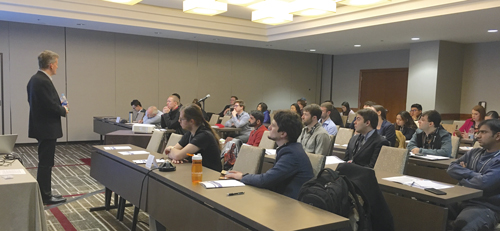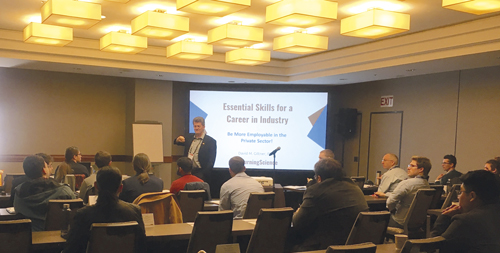David Giltner, founder of TurningScience, gives tips on how postgraduates and early-career scientists can make themselves more attractive to commercial organisations
As a private sector career mentor for scientists and engineers, I frequently get questions from recent graduates along the lines of: ‘So many private sector job descriptions say they want previous industry experience. How am I supposed to get my first industry job when I haven’t worked in industry?’ This can be especially concerning for anyone who spent additional years in academia completing a PhD. Job descriptions requesting previous industry experience can leave them wondering if their time would have been better spent in industry, rather than investing in additional training.
Fortunately, this is not actually the problem that it may seem. The first thing to realise is that everyone who is currently working in industry got their first industry job with no prior experience. Clearly there must be a way to make this seemingly impossible transition!
The second important thing to realise is that a job description is never truly a list of ‘must haves’ the way it may seem to the early career job seeker. A job description is a list of preferences based on the hiring manager’s best effort to convert their vision of the person who could solve their problems into a few paragraphs and bullet points. Hiring managers realise that their chances of finding a perfect fit for every qualification they list in the description is not very high.

David Giltner leading a career workshop at Photonics West in February
While hiring managers certainly may prefer to hire someone with previous industry experience, most of the time they do not actually need it for the jobs that new graduates may qualify for. What they want is someone who understands the work habits that bring success in a company setting, and they worry that recent graduates will have academic work habits.
Many industry managers are particularly worried about a candidate who just completed an advanced degree. While they understand that this additional technical training is valuable, they also know that the private sector is very different than academic research. They know that someone with a PhD has just spent years in a research lab where they were allowed to spend years to complete a single project, and this may have led to work habits that are counterproductive in the private sector.
A PhD student may spend years studying a novel idea, working to fully understand the problem and generate publishable results. Companies, on the other hand, need to be focused on practical results that can be sold to customers. Academic research is focused on theories and new knowledge. Industry is focused on products and solutions. Many managers worry that if they hire graduates with no industry experience, they will have to invest in teaching them how to be productive in an industry environment. If they suspect a candidate would prefer to spend years working on interesting problems and not focused on achieving profitable results for the company, they will not want them on the team.
Academic research is focused on theories and new knowledge. Industry is focused on products and solutions.
If you don’t have industry experience, there is nothing you can do to change that. But you can show them that you understand the industry environment and what behaviours they will need from you if they bring you on to their team. Take it upon yourself to learn how the private sector operates, and what thinking and working habits your industry manager will need from you. Show them that you are not the stereotypical academic researcher who wants to spend years working on a single problem.
What’s the best way to do this? Focus on being effective, not smart. Of course, this statement is a bit tongue-in-cheek. Clearly, being smart is an important and valuable aspect of any technical career. But what I like about this perspective is that it reminds me that results are what are most important to your private sector employer, and that you don’t want to let your need to appear smart get in the way of making progress.
You don’t want to let your need to appear smart get in the way of making progress.
One of the complaints I hear frequently from industry managers is that the early-career STEM graduates on their team are often afraid to try things that might not work, for fear of people thinking they aren’t smart enough. This is a natural habit coming from a university setting, where the goal is to answer test questions correctly and pass the course. Pursuing a post-graduate degree, where you will ultimately be grilled by a committee of reviewers on a project for which you are expected to be the expert, only reinforces this habit.
In industry, things are different. R&D teams need to make fast progress towards results that make money, so the company can stay competitive and financially sound. Often, the fastest way to a good result is to test things quickly to see what doesn’t work, so you can find out what does. The goal is to arrive at a working solution, not to prove that you know the right answer. This is a tough thinking pattern shift for many STEM graduates.

David Giltner gives essential advice on how to get on the first rung of the photonics career ladder
How can you use this habit to help you get an industry job when you have no experience? If you show that you focus on being effective, rather than being smart, as so many early-career scientists and engineers do, people will believe that you might transition smoothly into the private sector and quickly become a contributor to the team.
Tell stories of how you have taken actions to get fast results, or were willing to risk being wrong if it meant moving quickly. Rather than listing your skills and expertise on your resume/industry CV, outline accomplishments that show that you were focused on getting to results quickly. Rather than describing complicated ideas that you studied, describe why your results mattered to anyone outside your specific research field.
Strong technical skills, paired with a clear understanding of what work habits an industry manager needs from their team members, make you a strong candidate – even with no prior industry experience. You will show that you have done your homework, and that you understand the career path you are asking for the opportunity to begin.
--
David Giltner is the owner of TurningScience and a speaker and mentor for early career scientists and engineers. He has spent more than 20 years commercialising photonics technologies, and began lecturing on technical career building in 2010, after Turning Science into Things People Need was published.

